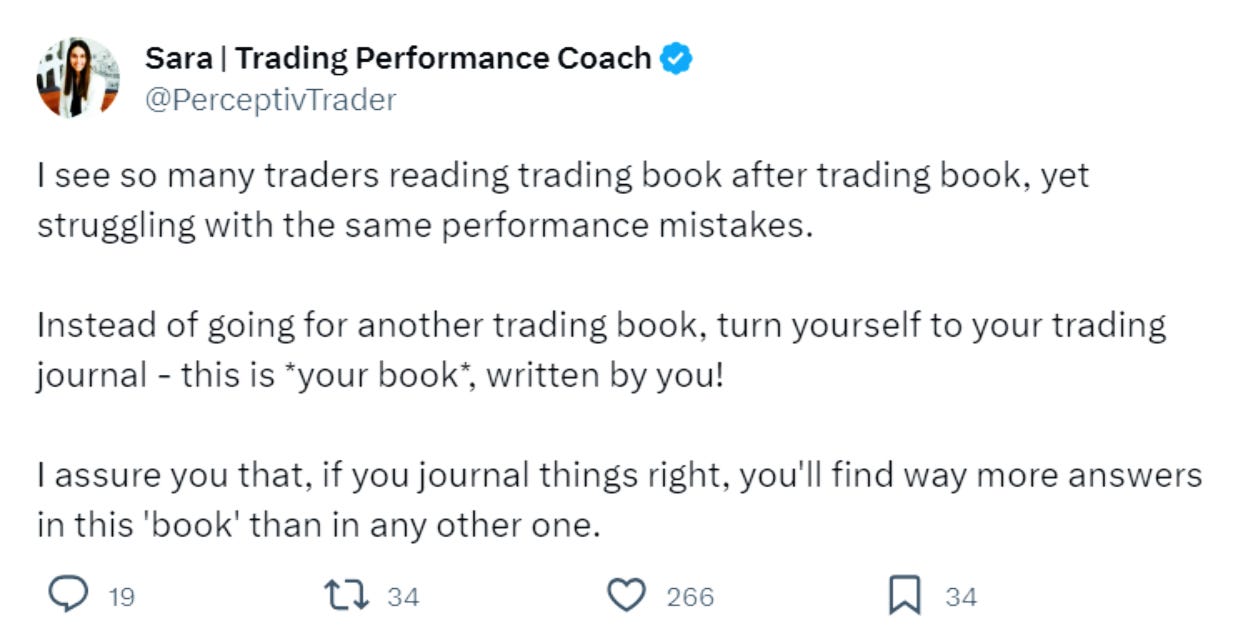Listen to this post as a podcast on the Web, Apple, Spotify, Amazon, or below.
Voiceover
Thursday Trader's Tip is the free edition of The High-Performing Trader. Each issue presents to-the-point trading psychology advice that can be read in under 5min.
This week’s topic is ‘Journaling’.
While books can provide new perspectives and knowledge, they can also give you a false sense of progress.
We’re naturally learners and we constantly seek new stimuli to expand our knowledge. However, the pursuit of new external information can distract you from what needs fixing inside your trading.
For those of you struggling with performance issues, the key doesn't lie in accumulating outside information like trading books. Your real "book" in this case is your trading journal - the biggest source of feedback you can extract from your trading practice.
This being said, I’m not preaching that reading is bad, but if you’re struggling with trading mistakes, prioritize what needs attention and then, use the extra time to read some pages and generate new ideas for your trading business.
A good journal analysis only comes with a good journaling process. Here are some practical tips:
Keep It Simple: Avoid overcomplicating things. If you can't maintain consistency with multiple journals or an excessive number of variables, start small. Aim for consistency and add elements as you go.
A Screenshot Is Worth a Thousand Words: Save screenshots of your trades with entry, stop loss, and exit points. You can also include some text boxes with important information. This minimizes the friction for post-trade analysis.
Be Creative, Adapt Journaling To You: There are multiple ways of journaling. If the old Excel doesn’t work for you, here are some creative ideas that might resonate better:
Voice record your thought process and emotions while trading. Listen to it afterward and take notes.
Journal in daily cards (word document) where you describe your trading session from start to end with screenshots of the trades. This offers a better picture of the whole session and your thought process from trade to trade;
Screen record your sessions and watch them afterward to boost your awareness. Watching yourself performing has a bigger impact that acts as a motivator to fix mistakes;
Create a private server on Discord to journal. This allows you to have everything online and intercalate images with text easily. You can create different channels for different journals;
Journal in a public blog where you talk about your trading sessions and discuss improvements. This increases accountability and at the same time, it can fulfill your purpose to deliver knowledge to newer traders.
Create an Accountability Group: put together a few traders of the same market as you and with similar trading styles. Share your journals with each other and exchange ideas.
Regular Analysis: Analyzing your journal is like watching a movie - you never catch all the details on the first viewing. Analyze your trades at the end of the day and again at the end of the week. This will help you bring the big picture to the end of the week to avoid accumulating emotion for the week ahead.
Don’t limit yourself to what others do or say it’s best. Adapting trading processes to you takes independence, boldness, and a little bit of creativity that will pay you off with consistency.
Happy trading,
Sara
P.S. Given the high interest in the journaling topic, I’ll explore it more in-depth in a future long-format newsletter.
If you loved this post, consider becoming a paid subscriber to unlock full access to The High-Performing Trader:
Whenever you’re ready, there are 3 ways I can help you:
My E-Book ‘Building The Mindset Of a Trader’: Includes practical activities, a private community of traders, access to past and future live classes, and a library of trading journals.
One-on-One Coaching Program: Various packages are available with different timeframes, and prices. See if you qualify here.
My Twitter: Read daily nuggets of wisdom to improve your trading psychology & performance.



This was just what I needed. Been taking screenshots but struggling to put them in a good format for review. Just set up a discord channel and recorded today's trades with the screen shots. I think this is going to help A LOT!
Great journaling ideas. I like that idea of creating a Discord server to journal. I also see people reading lots of trading books, and agree that journaling can help more. After all, trading is a performance skill